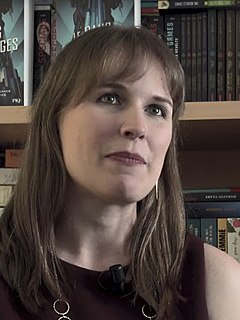A Quote by Alice Hoffman
In the darkest hour of winter, when the starlings had all flown away, Gretel Samuelson fell in love. It happened the way things are never supposed to happen in real life, like a sledgehammer, like a bolt from out of the blue. One minute she was a seventeen year-old senior in high school waiting for a Sicilian pizza to go; the next one she was someone whose whole world had exploded, leaving her adrift in the Milky Way, so far from earth she was walking on stars.
Quote Topics
Adrift
Away
Blue
Bolt
Darkest
Darkest Hour
Earth
Far
Fell
Flown
Go
Had
Happen
Happened
Her
High
High School
Hour
Leaving
Life
Like
Love
Milky Way
Minute
Never
Next
Old
One Minute
Out
Pizza
Real
Real Life
School
Senior
Seventeen
She
Sicilian
Someone
Starlings
Stars
Supposed
The Next One
Things
Waiting
Walking
Way
Whole
Whole World
Whose
Winter
World
Year
Related Quotes
She wondered whether there would ever come an hour in her life when she didn't think of him -- didn't speak to him in her head, didn't relive every moment they'd been together, didn't long for his voice and his hands and his love. She had never dreamed of what it would feel like to love someone so much; of all the things that had astonished her in her adventures, that was what astonished her the most. She thought the tenderness it left in her heart was like a bruise that would never go away, but she would cherish it forever.
At that moment a very good thing was happening to her. Four good things had happened to her, in fact, since she came to Misselthwaite Manor. She had felt as if she had understood a robin and that he had understood her; she had run in the wind until her blood had grown warm; she had been healthily hungry for the first time in her life; and she had found out what it was to be sorry for someone.
One of the most unfortunate things I see when identifying youth players is the girl who is told over the years how great she is. By the time she's a high school freshman, she starts to believe it. By her senior year, she's fizzled out. Then there's her counterpart: the girl waiting in the wings who quietly and with determination decides she's going to make something of herself. Invariably, this humble, hardworking girl is the one who becomes the real player.
She had witnessed the world's most beautiful things, and allowed herself to grow old and unlovely. She had felt the heat of a leviathan's roar, and the warmth within a cat's paw. She had conversed with the wind and had wiped soldier's tears. She had made people see, she'd seen herself in the sea. Butterflies had landed on her wrists, she had planted trees. She had loved, and let love go. So she smiled.
When I lost my wife I had a whole different concept of her life. She lived 21 years and people who knew her know it wasn't about the great things she did on this earth. It wasn't that she had money or had popularity, it was that she loved Jesus Christ more than anything else in this world. That was how she related to the world.
She didn't feel thirty. But then again again, what was being thirty supposed to feel like? When she was younger, thirty seemed so far away, she thought that a woman of that age would be so wise and knowledgeable, so settled in her life with a husband and children and a career. She had none of those things. She still felt as clueless as she had felt when she was twenty, only with a few more gray hairs and crow's feet around her eyes.
So she had to satisfy herself with the idea of love - loving the loving of things whose existence she didn't care at all about. Love itself became the object of her love. She loved herself in love, she loved loving love, as love loves loving, and was able, in that way, to reconcile herself with a world that fell so short of what she would have hoped for. It was not the world that was the great and saving lie, but her willingness to make it beautiful and fair, to live a once-removed life, in a world once-removed from the one in which everyone else seemed to exist.
Dena had always been a loner. She did not feel connected to anything. Or anybody. She felt as if everybody else had come into the world with a set of instructions about how to live and someone had forgotten to give them to her. She had no clue what she was supposed to feel, so she had spent her life faking at being a human being, with no idea how other people felt. What was it like to really love someone? To really fit in or belong somewhere? She was quick, and a good mimic, so she learned at an early age to give the impression of a normal, happy girl, but inside she had always been lonely.
Were all first loves like that? Somehow she doubted it; even now it struck her as being more real than anything she'd ever known. Sometimes it saddened her to think that she'd never experience that kind of feeling again, but then life had a way of stamping out that intensity of passion; she'd learned all too well that love wasn't always enough.
Tessa had begun to tremble. This is what she had always wanted someone to say. What she had always, in the darkest corner of her heart, wanted Will to say. Will, the boy who loved the same books she did, the same poetry she did, who made her laugh even when she was furious. And here he was standing in front of her, telling her he loved the words of her heart, the shape of her soul. Telling her something she had never imagined anyone would ever tell her. Telling her something she would never be told again, not in this way. And not by him. And it did not matter. "It's too late", she said.
She felt so old, so worn out, so far away from the best moments of her life that she even yearned for those that she remembered as the worst… Her heart of compressed ash, which had resisted the most telling blows of daily reality without strain, fell apart with the first waves of nostalgia. The need to feel sad was becoming a vice as the years eroded her. She became human in her solitude.
...she merely wished to find a way out of the maze. She knew that she had become a burden to him: she took things too seriously, turning everything into a tragedy, and failed to grasp the lightness and amusing insignificance of physical love. How she wished she could learn lightness! She yearned for someone to help her out of her anachronistic shell.






































